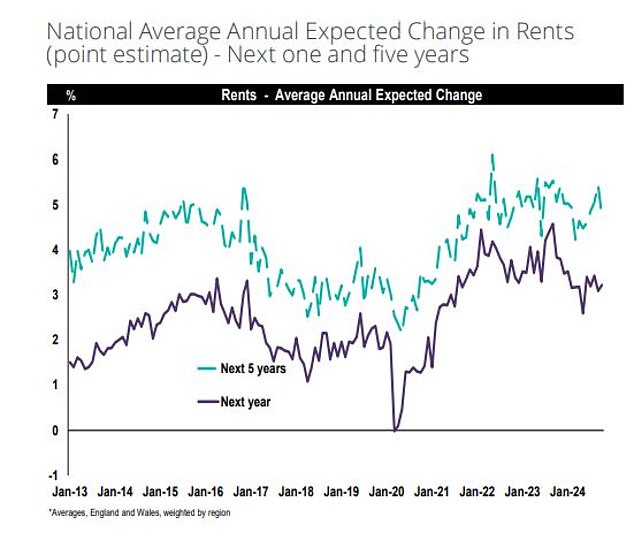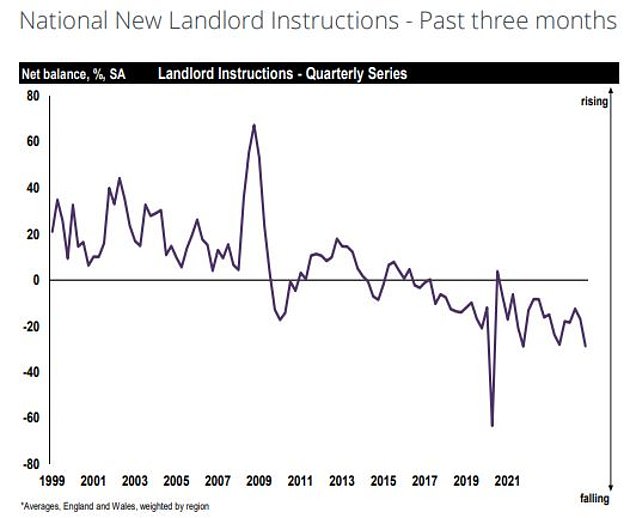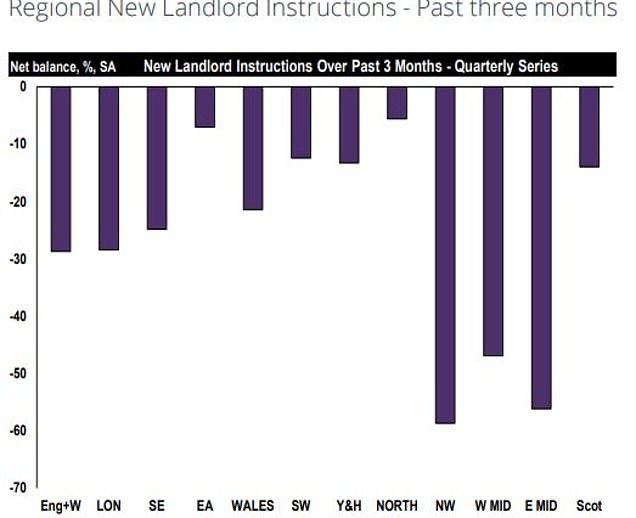Table of Contents
Renters will compete for fewer homes and pay increasingly higher prices thanks to Labour’s attack on landlords, according to a closely watched survey of property experts.
The latest survey by the Royal Institution of Chartered Surveyors reported that the number of available rental properties was declining while demand from tenants was increasing.
One said rents “must rise” as a result of the stamp duty increase for landlords announced in the October Budget, while another said “the cult of buy-to-let is dead”.
Some of the agents surveyed gave their opinion before the Budget on October 30, so the readings could be more discouraging in the future.
In the Budget, homeowners saw more unwanted changes, including an increase in stamp duty on the purchase of rental homes and second homes.
These buyers were already facing a 3 per cent surcharge on top of what those buying a property to live in currently pay.
However, from October 30 that figure rose to 5 per cent, adding thousands of pounds to the cost of buying rental homes and second homes.
Gap: the chasm between the supply of properties available for rent and growing public demand from tenants continues to widen, according to Rics members
Rachel Reeves says this will free up around 130,000 homes, as more homes will now be bought by owner-occupiers, rather than landlords.
However, while that may be good news for aspiring homeowners, it also means fewer homes in the private rented sector.
Many Rics members criticized Labour’s budget for making tenants’ situation worse, not better.
Andrew Oulsnam, of Oulsnam letting agents in Birmingham, said: ‘Problems in the rental market persist, with too many tenants not seeking enough properties.
“The budget will make things worse and, as a result, rents will have to go up.”
Neil Foster of Hadrian Property Partners in Hexham added: ‘The rental stock continues to decline, putting further upward pressure on rental levels.
“It is a mystery where the inhabitants of Westminster’s Ivory Tower expect most of the private tenants to live.”
Daniel Wiltshire, actuary and independent financial adviser at Wiltshire Wealth, says a number of his buy-to-let clients have decided that property investment is no longer for them.
“The buy-to-let cult is dead,” Wiltshire said. ‘I have had several meetings with potential property investors who have decided to pull out and look at stocks and shares instead.
“The national psyche is programmed to invest money in bricks and mortar, but the recent increase in stamp duty, along with other incremental tax increases over the last 10 years, has made even the most die-hard property enthusiasts question the wisdom of putting all your eggs in one, highly taxed basket.’

Rents expected to rise: chart shows how Rics members’ forecasts have changed
Fall in homeowners buying new properties
Problems for renters persist as rental properties continue to disappear from the market and many potential investors no longer want to buy new properties.
Across the UK, Rics members reported fewer homeowners looking for new properties, but in the North West and the Midlands this was particularly prevalent.
Will Ravenhill, of Readings Property Group in Leicester, added: “Many more landlords are looking to sell because they are fed up with successive attacks by governments on the private rental sector.”
The Labor Government is introducing a tenants’ rights bill to end Section 21 “no-fault” evictions, which will become law in summer 2025.
John Chappell, a member of Rics based in Skegness, Lincolnshire, said: “The market remains very unstable due to growing concerns about the extension of tenants’ rights.”
“Increased costs and administration will mean that there will be less accommodation available to rent.”
Fewer homeowners coming to market – charts show the net balance is negative, meaning more Rics members are seeing fewer instructions from new homeowners in their local areas.
What will happen to rents?
More Rics members, including estate agents and surveyors, said they had seen an increase in tenant demand between August and October than those who said demand had decreased.
During that same time, they also said the number of new rental homes coming to the market dropped.
Most agents and surveyors expect rental prices to increase in the coming months and years, due to this mismatch between supply and demand.
Across all UK regions, more Rics members said rents would rise in the next three months than those who said rents would fall. This was most overwhelmingly the case in Wales, the Midlands and Yorkshire and the Humber.
Colin Townsend, of John Goodwin estate agents in Malvern, Worcestershire, said: ‘Rents continue to rise. This trend is likely to continue as there was very little stimulus in the budget to persuade landlords to invest in the rental market.’
Daryl Woodward, of Peninsula Estates in Wirral, near Liverpool, said there was “fewer instructions, as landlords leave the market, rents rise and tenant demand rises, with fewer properties to let”.
Over the last four years, the average rent for a property in the UK has increased by 34 per cent, according to Zoopla. Some cities have seen steeper rent increases of more than 40 percent.
Over the next five years, Rics members expect rents to rise by around 5 per cent each year on average.
Some links in this article may be affiliate links. If you click on them, we may earn a small commission. That helps us fund This Is Money and keep it free to use. We do not write articles to promote products. We do not allow any commercial relationship to affect our editorial independence.




